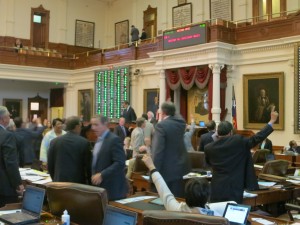Amid Talk of Trust, Water and the Death Star, House Postpones SJR1 Yet Again

Mose Buchele
Lawmakers in the House voting for a rule suspension to postpone a vote on SJR1 until Wednesday.
Update: SJR1 was finally approved in the Texas House on Wednesday night. Read more here.
Right now Texas does not have the capacity to supply water to everyone who wants it in times of drought. Lawmakers have talked about taking money from Texas’ rainy day fund to fix that problem for years. On Monday, a vote was scheduled in the State House to help make the plan a reality. It would call for a constitutional amendment to set up two bank accounts to loan out money for water projects. Now, it’s Wednesday and the vote still has not come.
The measure, called Senate Joint Resolution One, is about water. But the intrigue surrounding it is about money. A vote on the resolution was postponed Monday, then again on Tuesday afternoon. There is a Texas House rule saying it had to be voted on by midnight last night, so that seemed like a sure thing. Except lawmakers suspended that rule later in the evening.
Why the delay?
“A lot of the members are confused on what’s in Senate Bill One, what’s in House Bill 1025, what’s this SJR, what’s this all these different bills. HB6, HB7, and frankly, we don’t know what’s in HB 1025,” House Appropriations Committee Chairman Jim Pitts, who is trying to shepherd the resolution through the House, said after the plan to postpone was announced.
That list of different House and Senate measures may sound confusing, but it gives a sense of just how complicated the deal to pass SJR1 has become.
What Pitts was saying was that House votes on the water plan depend on Senate votes on other bills. That’s especially true for Democratic lawmakers in the House. They’ve pledged their support for water contingent on the Senate increasing money for education and other projects. And they don’t want to vote on water, until they’re sure they’ve received those concessions.It’s almost like the politicians don’t trust each other.
But Rep. Yvonne Davis, who leads the House Democratic Caucus, wouldn’t put it that way.
“I don’t think it’s a break down in trust as much as it is just wanting to be sure,” she told StateImpact Texas.
Davis says they won’t be sure until the Senate takes up House Bill 1025, the supplemental budget measure, today. That bill also happens to set aside $2 Billion dollars to put in those empty bank accounts the House has put off voting on.
And that’s where another plot twist enters the picture.
For some lawmakers, spending billions of dollars on projects is a bad idea. And hearing the House talk about it is almost like watching the Death Star re-energize to take down the rebel alliance in the Star Wars movies. At least that’s how it was framed by Plano Republican State Rep. Van Taylor on his facebook page last week.
“So I’m on Endor working with the Ewoks. To try and stop the force field for the Death Star before it becomes operational,” Taylor joked after the measure was postponed.
Taylor and other Tea Party conservatives want to see the water resolution, and all the spending that goes with it, sunk. He says judging from the back-and-forth between the House and Senate, and the Republicans and the Democrats, he likes his odds.
“It’s a multi-faceted complicated plan or deal that they need to come to, and they just literally have never come to it. And different parties as different times have said ‘oh we’ve got a deal’ but literally within hours it basically just falls apart,” he told StateImpact Texas.
But it only has to come together once to count. That’s when lawmakers take those crucial votes on the budget and the water resolution. Those votes are scheduled to happen later today, and they can’t be postponed forever.
The legislative session ends on Monday.

